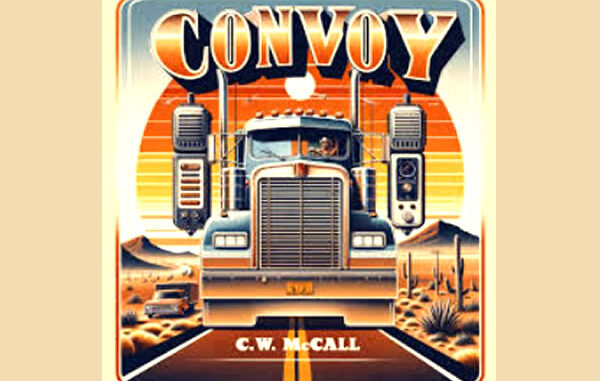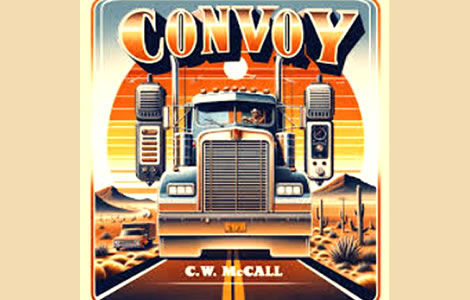
Released in 1975, C.W. McCall’s “Convoy” became an unexpected hit that not only topped the charts but also inspired a movie that captured the spirit of a rebellious America.

The song, driven by the popularity of CB radio culture, had a unique blend of country music and storytelling that resonated with many during a time of political and social unrest.
The song’s narrative about a group of truckers forming a convoy to defy oppressive regulations and law enforcement symbolised a widespread sentiment of rebellion against authority.
The Popularity of CB Radio
During the mid-1970s, CB (citizens band) radio was at the peak of its popularity.
Originally used by truckers for practical communication, it became a cultural phenomenon.
The public, fascinated by the lingo and the sense of community it provided, quickly adopted CB radio, making it a staple in many households and vehicles.
“Convoy” capitalised on this trend, weaving CB slang and the spirit of camaraderie among truckers into its lyrics, which appealed to both truckers and the general public alike.
The song’s catchy refrain and vivid storytelling captured the zeitgeist of the era, where CB radios were a symbol of freedom and resistance.
Chart Success and Global Impact
“Convoy” topped the Billboard Hot 100 chart in the United States, a remarkable feat for a country song.
It also found success across the pond, reaching the number two spot on the UK Singles Chart. The song’s international appeal highlighted the universal resonance of its themes—freedom, rebellion, and unity against authority.
Its success was not limited to English-speaking countries; it charted in various countries worldwide, becoming a rallying cry for those who identified with its message.
Convoy: The Movie
The success of “Convoy” led to the creation of a 1978 movie of the same name, directed by Sam Peckinpah.
The film starred Kris Kristofferson as Martin “Rubber Duck” Penwald, a trucker who becomes the reluctant leader of a convoy.
Kristofferson’s portrayal of Rubber Duck added depth to the character, transforming him into a symbol of defiance and leadership.
Known for his rugged good looks and charismatic presence, Kristofferson brought a sense of authenticity and charm to the role, which resonated with audiences.
Kris Kristofferson: A Multifaceted Star
Kris Kristofferson, a talented singer-songwriter and actor, was already a well-known figure by the time “Convoy” was released. His prior hits like “Me and Bobby McGee” and “Help Me Make It Through the Night” had established him as a country music icon.
His transition to acting, particularly in films like “Pat Garrett & Billy the Kid” and “Alice Doesn’t Live Here Anymore,” showcased his versatility.
In “Convoy,” Kristofferson’s performance added a layer of grit and determination, making Rubber Duck an enduring figure in the pantheon of anti-establishment heroes.
Sheriff Wallace: The Antagonist
Ernest Borgnine’s portrayal of Sheriff Lyle “Cottonmouth” Wallace in “Convoy” provided a formidable antagonist. Borgnine, an Academy Award-winning actor, brought a menacing yet complex dimension to the character.
Sheriff Wallace, much like Sheriff Buford T. Justice from “Smokey and the Bandit,” embodied the oppressive arm of the law, determined to break the convoy.
Borgnine’s performance was both intense and memorable, creating a character that audiences loved to hate.
His role underscored the tension between the free-spirited truckers and the rigid law enforcement, a common theme in 1970s cinema that mirrored societal sentiments.
The Political Message
“Convoy” and its subsequent movie adaptation were more than just entertainment; they were reflections of the political climate of the time.
The 1970s in America were marked by disillusionment with the government, stemming from events like the Watergate scandal and the Vietnam War.
The song and film tapped into the collective frustration and desire for autonomy, portraying truckers as modern-day outlaws fighting against a corrupt system. This narrative struck a chord with audiences who felt similarly disenfranchised, making “Convoy” a cultural touchstone.
Convoy is a powertrack hit on Capitol fm
Today, “Convoy” is remembered not only for its commercial success but also for its cultural impact.
The song’s message of unity and resistance continues to resonate, serving as a reminder of an era when music, film, and popular culture were powerful vehicles for social commentary.
The song has been used in various contexts as a rallying cry for people power, and its influence can be seen in the continued popularity of trucking culture in media.
“Convoy” recalls a time when the irreverence towards authority and the celebration of individualism were at the forefront of American culture.
It stands as a testament to the power of music and film to capture and reflect the spirit of an age. From its chart-topping success to its cinematic adaptation, “Convoy” remains an enduring symbol of rebellion and the enduring human spirit’s fight for freedom.
